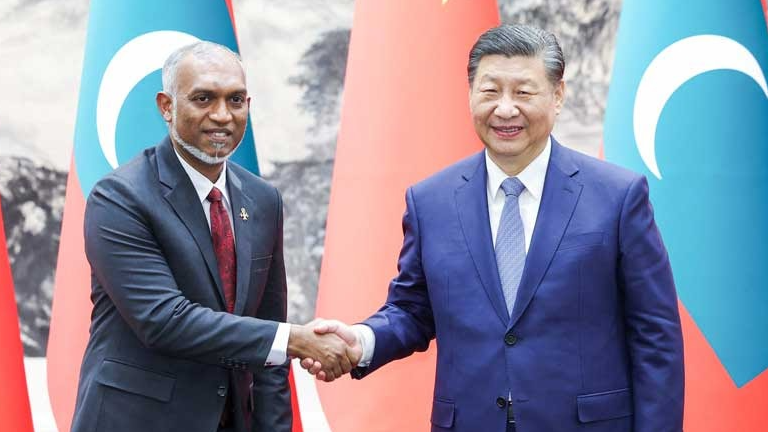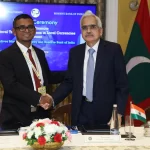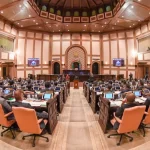Male’, Maldives — In recent days, Indian media has turned its attention to the Maldives’ precarious financial situation, spotlighting India’s potential role in aiding the island nation while keeping an eye on China’s growing influence. Outlets like Rediff and NDTV have emphasized the diplomatic shuffle, with Maldivian officials visiting both India and China. As these two regional giants circle the archipelago, it’s clear the Maldives, facing a looming economic crisis, finds itself caught in a delicate geopolitical balancing act.
Indian media has reported extensively on the visits of Maldivian officials to India, where relations have taken center stage. Rediff noted that a Maldivian ministerial delegation toured India’s high-profile Mumbai-Ahmedabad bullet train project, a symbol of Indian infrastructure advancement. Meanwhile, NDTV reported India’s plan to extend a $400 million currency swap to the Maldives, with the possibility of tapping into an additional $800 million line of credit first established in 2019. These moves are seen as ways for India to bolster its influence while assisting the Maldives in avoiding an economic collapse.
But China is far from sitting idle. The announcement of the Industrial and Commercial Bank of China (ICBC) opening a branch in Malé signals Beijing’s intent to deepen financial ties. China’s central bank also signed a memorandum of understanding with the Maldives, enabling local currency payments—a step designed to alleviate the Maldives’ foreign exchange struggles. Additionally, the Chinese Ambassador to the Maldives has announced that a total of 20 participants will be leaving tonight for an intensive three-week volleyball coaching program in Hangzhou, sponsored by the Chinese government, further demonstrating Beijing’s commitment to strengthening its relationship with the island nation.
Debt and Diplomatic Balancing
For the Maldives, the stakes are high. Years of mounting debt, exacerbated by the COVID-19 pandemic’s impact on its tourism-driven economy, have pushed the country to a breaking point. Much of this debt is owed to China, tied to large infrastructure projects whose benefits remain uncertain. As debt servicing deadlines loom, global rating agencies like Moody’s have issued stark warnings, with Moody’s downgrading the country’s credit rating just last week. The risk of a default seems imminent.
Despite these troubling indicators, Maldivian officials remain optimistic. Finance Minister Mohamed Shafeeq, speaking to journalists in Colombo, downplayed the need for an International Monetary Fund (IMF) bailout, characterizing the financial challenges as temporary. The government’s message is clear: they believe they can weather the storm without turning to the IMF.
Meanwhile, the Maldives continues to carefully balance its diplomatic relationships. Recent visits to India and China by top Maldivian officials highlight this tightrope act. While the Minister of Construction and Infrastructure toured Mumbai’s AFCONS construction sites, the State Minister of the same ministry was in China, underscoring the strategic effort to court both of its powerful neighbors.
President Muizzu’s Political Maneuvering
Adding another layer to the situation is President Mohamed Muizzu’s upcoming visit to New Delhi. According to Indian outlet First Post, the announcement came ahead of formal diplomatic arrangements, signaling Muizzu’s eagerness to repair ties with India after months of tension. Muizzu, who rose to power on the back of the controversial “India Out” campaign, now seeks to mend fences with New Delhi—a move that could be crucial as the Maldives looks for financial lifelines.
Politically, this visit is significant. With the Maldives inching closer to default, improving relations with India could help secure much-needed financial support. Yet, opposition figures and government critics remain skeptical. The government confirms that the two junior ministers, who were on paid suspension for vocally abusing India, resigned last week, potentially signaling that Muizzu’s administration is making overtures to New Delhi. However, questions remain about whether this shift is genuine or merely a calculated maneuver to secure aid.
Security Concerns: A Tug-of-War
While economic concerns dominate, security issues linger. Relations between the Maldives and India have been particularly strained in this area, with cooperation lagging. However, recent developments signal improvement. A delegation from the Maldivian National Defence Force (MNDF) visited New Delhi earlier this month to discuss maritime security under India’s SAGAR initiative, aimed at enhancing regional stability in the Indian Ocean.
At the same time, the Maldives’ defense relationship with China is drawing scrutiny. The current visit by the Maldives defense minister to Beijing has sparked speculation about arms deals and technological partnerships. Opposition media outlets allege the Maldives is exploring Chinese surveillance technology, a development that would undoubtedly strain relations with India further. Additionally, China’s continued interest in the strategically located Laamu Atoll, paired with India’s previous investments in the UTF project, adds intrigue to the already complex security landscape.
Navigating Uncertain Waters
For the Maldives, the road ahead is fraught with challenges. The twin giants of India and China are circling, each offering lifelines with different strings attached. President Muizzu’s government must tread carefully, balancing these offers while safeguarding its own domestic and international standing.
India’s readiness to assist, paired with China’s desire to expand its influence, places the Maldives in a delicate position. Its immediate economic survival hinges on navigating these competing interests, but the long-term implications—on sovereignty, security, and economic independence—remain uncertain.
As the next few months unfold, the Maldives must walk a fine line, making tough decisions that will shape its future. Whether it can avert an economic collapse while maintaining its political independence and security cooperation is the question hanging in the balance. One thing is clear: all eyes, in both New Delhi and Beijing, are on the Maldives, with India once again acting as the usual lifeline for the island nation.












